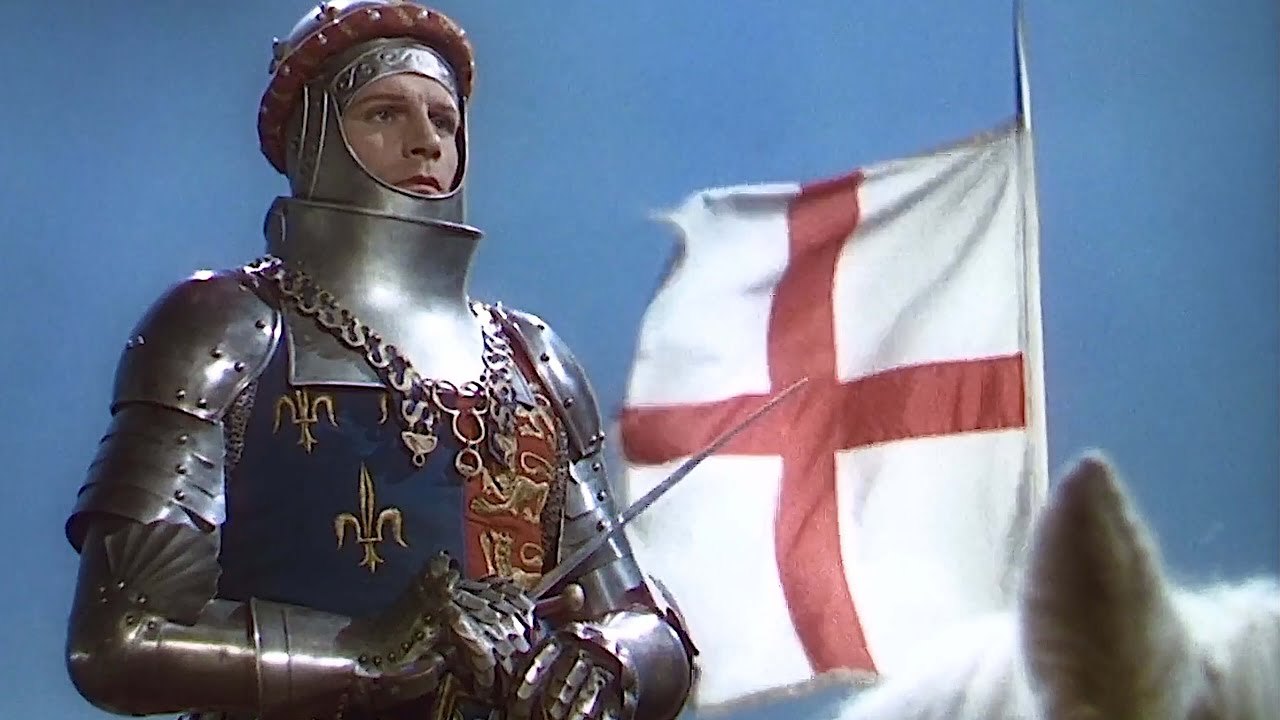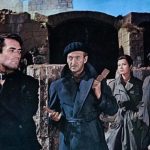Henry V – 1944

Henry V (1944), directed by and starring Laurence Olivier, is a seminal film adaptation of William Shakespeare’s historical play. Released during World War II, the film not only serves as a remarkable cinematic interpretation of Shakespeare’s work but also resonates deeply with the wartime context in which it was produced. Laurence Olivier’s adaptation is celebrated for its artistic brilliance, thematic depth, and its powerful reflection of contemporary issues. This essay delves into the film’s plot, character development, thematic elements, visual style, and its historical significance.
Henry V is a cinematic adaptation of Shakespeare’s play of the same name, which chronicles the events of the Hundred Years’ War between England and France. The film centers on King Henry V of England, focusing on his leadership, the challenges he faces, and his pivotal role in the Battle of Agincourt.
The narrative begins with Henry V’s ascension to the English throne and his subsequent decision to claim the French crown, leading to a series of military campaigns. The film depicts Henry’s strategic acumen, his ability to inspire his troops, and the personal sacrifices he makes for his country. Key events include the famous Battle of Agincourt, where Henry’s leadership and the valor of his men turn the tide of the war against overwhelming odds.

The film’s climax centers on Henry’s victory at Agincourt and his subsequent negotiation for peace with the French. Olivier’s adaptation captures the themes of honor, bravery, and the burdens of leadership, culminating in a dramatic and triumphant portrayal of Henry’s legacy.
Laurence Olivier’s portrayal of King Henry V is both commanding and nuanced. Olivier’s performance as Henry V captures the complexity of the character, from his initial doubts and struggles to his eventual transformation into a revered leader. His depiction of Henry’s inspirational speeches and his interactions with his soldiers highlight the king’s charisma, strategic brilliance, and human vulnerability.
The supporting cast also delivers strong performances, contributing to the film’s rich character tapestry. Notable actors include Robert Newton as Pistol, a soldier with a colorful personality, and Esmond Knight as the Duke of Exeter, who provides a steady and loyal presence. The ensemble cast brings depth and authenticity to the various roles, enhancing the film’s portrayal of medieval life and wartime camaraderie.
Henry V explores several significant themes, including leadership, patriotism, and the nature of warfare. One of the central themes is the concept of leadership and the burdens it entails. The film portrays Henry as a leader who is deeply committed to his country and its people. His transformation from a young prince to a revered king underscores the complexities of leadership and the personal sacrifices required to inspire and lead others.

Patriotism and national pride are also prominent themes. The film reflects the wartime spirit of the 1940s, capturing the sense of unity and resilience that characterized the British war effort. Henry’s speeches, particularly the St. Crispin’s Day speech, are delivered with a fervor that resonates with the contemporary audience, reinforcing the film’s themes of courage and national pride.
The nature of warfare is another key theme. The film presents a romanticized yet realistic portrayal of medieval combat, highlighting both the heroism and the harsh realities of war. The depiction of the Battle of Agincourt is both dramatic and visually impressive, capturing the chaos and valor of the battlefield.
Henry V is notable for its innovative use of cinematography and visual style. Laurence Olivier employed a range of techniques to bring Shakespeare’s play to life, including the use of stylized sets and striking visual imagery. The film’s opening, which presents a theatrical prologue, sets the tone for the adaptation and establishes a connection between the stage and screen.

The film’s use of color and composition enhances its dramatic impact. The battle scenes, particularly the Battle of Agincourt, are choreographed with a sense of grandeur and realism. Olivier’s direction emphasizes the scale and intensity of the conflict, while also highlighting the emotional and personal aspects of the story.
The film’s score, composed by William Walton, contributes significantly to its emotional resonance. The music underscores the drama and intensity of the narrative, enhancing the film’s overall impact and atmosphere.
Henry V was released during World War II, and its timing gave the film a unique historical significance. The film was intended as both a tribute to British resolve and a morale booster for wartime audiences. Its themes of leadership, bravery, and national pride resonated strongly with contemporary viewers, providing a sense of inspiration and unity.

The film received widespread critical acclaim for its artistic and technical achievements. Laurence Olivier’s direction and performance were particularly praised, and the film is considered a landmark in Shakespearean cinema. Henry V is celebrated for its ability to translate the complexities of Shakespeare’s play into a cinematic form while retaining the play’s thematic depth and literary quality.
Henry V (1944) is a remarkable film that stands as a testament to Laurence Olivier’s vision and skill as both an actor and director. The film’s exploration of leadership, patriotism, and the nature of warfare is both compelling and poignant, offering a powerful reflection of its wartime context. Through its innovative visual style, strong performances, and thematic depth, Henry V remains a significant and influential adaptation of Shakespeare’s work, celebrated for its artistic brilliance and historical resonance.









